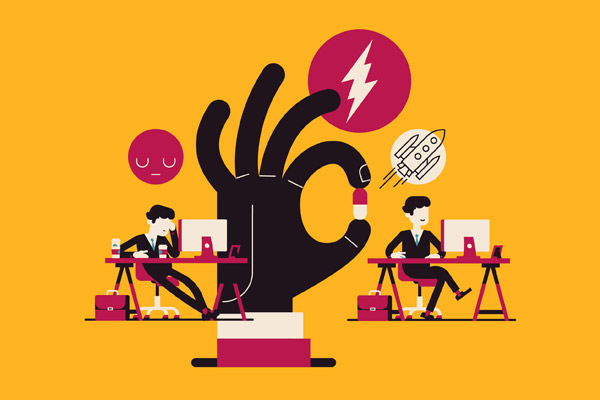Whether it is an extra cup of coffee, a shot of wheatgrass juice, or even the latest doping scandal, it seems that there are a lot of people trying to get ahead using substances.
As technology advances and biomedical research improves there are more and more substances to choose from. Some employees, even entire companies, are tapping into substances and practices that can give a kick-start to productivity. Some people have given these nootropic substances the label “smart drugs”.
The world of smart drugs
Nootropics, or smart drugs, are taken in the hopes that they will increase cognitive functioning. They are not meant to achieve a high in the same respect as illegal drugs. Their “high” is the improvement of work performance and productivity. Some of them are legal stimulants, like caffeine or nicotine. Others are prescription drugs used by people who may not have a medical reason for taking them. And then there are natural herbs and supplements, like gingko biloba, ginseng, and a variety of others.
While people can find most of these substances quite easily, in communities or online, there is little research into their short term and long term effects. They may produce some cognitive benefits, but some people who use them state that they have experienced anxiety, depression, insomnia, headaches, and upset stomach.
Dr. Reid Blackwelder, former president of the American Academy of Family Physicians states that it is dangerous to order substances online and then to take them without consulting a doctor. He also states that much of the research done that concludes that there are some cognitive effects were done on animals.
Estimates show that up to 20% of Ivy League college students have tried smart drugs. As those students graduate, some of them might carry those habits into the workplace. A Royal Society report stated that these kinds of products will have a variety of consequences in the business world.
Many managers and leaders are silent on this issue. Even though there are reports from various sources that smart drugs are becoming more popular (usage is up from 4.7% in 2009 to 6.7% in 2015, according to a German survey), that there are drugs labeled as “the drug of choice” (Ritalin and Modafinil), and that 1 in 5 people out of survey of 1,400 say they use smart drugs, it does not seem that anyone is taking action to investigate and stop their use.
The smart drugs of choice
There are many drugs that people use to try to increase cognitive performance, but there are some that researchers have studied more than others. The difficulty with persuading people not to use these substances is that, according to the research, they actually work.
Modafinil
Modafinil is the generic name for a drug that promotes wakefulness and is used to treat sleep disorders. But researchers at Harvard Medical School and Oxford found that Modafinil has positive effects on planning, decision-making, creativity, and learning when taken by people without a sleep disorder. When people who are lacking enough sleep take it, they focus better, plan more effectively, and react less impulsively.
The researcher in the Harvard/Oxford study even stated that this drug has few side effects, prompting the US military and Indian military to begin experiments with it.
In the business world, Ayumi Yu, an engineer at Entelo, takes Modafinil three days a week in order to feel rested during periods of sleep deprivation.
AD/HD medications
More and more doctors prescribe AD/HD medication, resulting in sales of almost $13 billion in 2015. These drugs are mostly listed under two drug categories: amphetamine and methylphenidate. There are many name brand drugs like Adderall and Ritalin that contain these drugs.
Research shows that when used by people without AD/HD these drugs improve memory formation, motivation, and performance.
Curious to know how you can improve employee engagement using neuroscience? Download our free eBook on Neuroscience in the Workplace!
Caffeine
Some people feel they cannot survive the morning without a cup of coffee or tea. Caffeine is a big part of this. Research shows that caffeine can make people feel more alert and improve their performance.
While most people have probably experienced the effects of just enough, or too much, caffeine, some people have turned to other drugs. Bob Carter is a financial analyst who uses other nootropics instead of coffee because he says coffee makes him too jittery.
Nicotine
Researchers studying nicotine, the drug found in most tobacco products, found that the drug provides positive effects on motor skills, attention, and memory.
Nicotine is often viewed negatively as it is so closely linked to smoking and the many health problems that smoking causes, but there is some research that supports its use. Studies have shown that nicotine is just as effective as AD/HD medications and Modafinil in terms of improving attention.
L-theanine
L-theanine is an amino acid found in tea. It is sold as a natural supplement as it promotes relaxation, attention, and alertness.
Jesper Noehr, a technology officer in San Francisco, takes advantage of the relaxation effects L-theanine provides. He takes it in combination with a variety of other nootropics like caffeine and phenylpiracetam because it helps to balance out the side effects of the stimulants.
Racetams
Racetams are a group of lab created molecules with names like piracetam, oxiracetam, and aniracetam. They are often marketed and sold as smart drugs but there are few studies available to back up those claims. The limited research done does show that these drugs have effects on the brain and that they can improve some aspects of memory and other cognitive impairments.
Entrepreneur Dave Asprey takes about 15 nootropics a day. He credits racetams, especially piracetam, with helping him clear his mind and improve his health.
While people can purchase all these drugs, legally or illegally, there are many doctors who also work specifically with people looking to improve cognitive functioning through smart drugs. Doctors like Vinh Ngo in San Francisco work with amino acids, IV drips, testosterone, and prescription drugs to give patients the extra boost they are looking for. They can also lead patients to companies like Nootrobox and Nootroo, who sell supplements filled with possible cognitive enhancing substances like theanine, melatonin, phenylpiracetam, and other vitamins and minerals.
With these drug showing some promising results in studies and with doctors specializing in performance enhancement, does it mean that they are okay to use?
The morals and ethics of smart drugs
As doctors, researchers, and businesses continue to explore the use of smart drugs, they bring with them the moral and ethical issues of using them. Just because they are available, should they be used? Does it give some an unfair advantage over others?
There are no easy answers to those questions and opinions differ, even within the same organization.
Duke University has a policy against using prescription drugs for cognitive enhancement. They go so far as to label it as cheating. Nita Farahany, a law professor at Duke University, feels that the policy takes away the opportunity for students to empower themselves.
Some people feel that using these substances encourages people to study and try even harder. Others feel that these drugs and their accessibility widen the performance gap between people that come from advantaged and disadvantaged backgrounds. Or maybe these drugs can be used to help people from disadvantaged backgrounds have an advantage.
It does not seem like there are easy answers, as the issues are complex and carry social and political weight.
In businesses, leaders and managers have the difficult task of deciding whether to discourage, encourage, or ignore the use of smart drugs, With the collaboration between insurance providers, businesses, and healthcare, senior staff at some companies can be highly involved in the health of their employees. Some companies have made exercise mandatory, while almost half use monetary rewards to encourage employees to participate in health screenings.
With the increase in investment employee health, leaders and managers have to decide how they will address the issues of smart drugs, an issue that does not seem to be going away anytime soon. Research does show that the drugs do have some positive mental effects, but what it does not show is at what cost. What do we sacrifice and what do we create by making it okay to use these substances?
Some argue that their use would put employee performance and productivity over possible health risks. Others feel that it could intensify the amount of competition in the already competitive corporate world. Then there are some who feel that drugs in the workplace could actually help employees have more free time as they will finish work faster.
If you were to take a survey of your company or coworkers, what do you think you would find? Are you using smart drugs or would you if they were safe and proven to work? Do you think smart drugs are a good way to have an advantage over the competition?
There are many questions with moral, ethical, and health consequences that we have to ask ourselves as technology advances and more and more substances are created that claim to put us one step ahead of our competition.
They may make us better, faster, stronger, or smarter but as they take over the education and the business worlds, are there any other consequences? Hopefully, more people can speak up about this important issue as these drugs do not seem to be going anywhere soon.
Download the eBook and learn how to use neuroscience to attract the right talent, retain high-performing employees and foster collaborative teams.
Image vector licensed from Depositphotos.com






I love how this blog celebrates diversity and inclusivity It’s a reminder that we are all unique and should embrace our differences
Your blog has become my go-to source for positive and uplifting content Thank you for consistently delivering high-quality posts
Your honesty and vulnerability in sharing your personal experiences is truly admirable It takes courage to open up and I applaud you for it
I want to express my appreciation for the writer of this blog post. It’s clear they put a lot of effort and thought into their work, and it shows. From the informative content to the engaging writing style, I thoroughly enjoyed reading it.
From the bottom of my heart, thank you for being a source of positivity and light in this sometimes dark and overwhelming world
Your positive energy and enthusiasm radiate through your writing It’s obvious that you are truly passionate about what you do
Looking forward to your next post. Keep up the good work!
Your posts are always so well-researched and informative I appreciate how thorough and detailed your content is
Your articles always make me think and reflect on my own life Thank you for prompting me to be introspective and make positive changes
This blog has opened my eyes to new ideas and perspectives that I may not have considered before Thank you for broadening my horizons
Their posts always leave us feeling informed and entertained. We’re big fans of their style and creativity.
I love how this blog covers a variety of topics, making it appeal to a diverse audience There is something for everyone here!
It’s always a joy to stumble upon content that genuinely makes an impact and leaves you feeling inspired. Keep up the great work!
Your posts are always so relatable and relevant to my life It’s like you know exactly what I need to hear at the right time
I do not even understand how I ended up here, but I assumed this publish used to be great
Thank you for creating such valuable content. Your hard work and dedication are appreciated by so many.
From the bottom of my heart, thank you for being a source of positivity and light in this sometimes dark and overwhelming world
Your posts are always so well-researched and informative I appreciate how thorough and detailed your content is
This blog post has left us feeling grateful and inspired
I just like the helpful information you provide in your articles